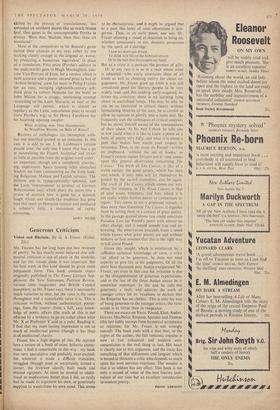Generous Criticism
Vision and Rhetoric. By G. S. Fraser. (Faber, 25s.)
MR. FRASER has for long been our best reviewer of poetry; he has clearly never believed that sub- stantial criticism is out of place in the weeklies, and for this reason alone it was important that his best work in this kind should be given more permanent form. This book contains essays originally published in The Times Literary Sup- plement, the New Statesman, Partisan Review, various little magazines and British Council pamphlets; as Mr. 'Fraser says, there is necessarily much variation in tone, but the voice is the same throughout and a remarkable vOice it is. This is criticism written, without authoritarian postur- ings, from the centre—from a full, easy know- ledge of poetic affairs (the truth of this is not affected by a tendency to go on rather about what Mr. X or Professor Y said in a pub). Reading it, 'I find that my most lasting impression is not so much of intellectual power (though it has that) as of intellectual charity.
Fraser has a high degree of this. He reprints here a review of a book of mine, hitherto anony- mous. I find it remarkable in this way: my book was very speculative and probably over-excited; but wherever it made ,a difficult transition, struggled through mud or uncertainly turned a corner, the reviewer silently, built roads and erected signposts. At times he seenied to under- stand its implications better than I did, so easily had he made its argument his own, so generously supplied its wants from his own mind. This seems to be characteristic; and it might be argued that to a poet this habit of total absorption is 'dan- gerous. Thus, in an early .poem, one sees Mr. Fraser allowing a mood of dejection to-bring on, whether consciously or not, demonic possession by the spirit of Coleridge: I now no more can dream
To drink new life of the habitual stream
Or in the hail that beats upon my head.. . . .
But to a critic it is perhaps the greatest of gifts.
Or at any rate it is so in a man whose mind is educated—who easily entertains ideas .of till kinds as well as choosing poetry for closer en- gagement. Mr. Fraser grew up while it was still considered good for literary people to be very widely read, and this reading, early acquired, in- forms his criticism; there is no learning lying about in uncivilised lumps. This may be why he can be so interested in critical theory without formulating theories of his own; he is careful to allow no opinion to petrify into a stone doll. He frequently uses the techniques of critical analysis; but he shows himself aware of the consequences of their abuse. At his best I think he tells you as few could what it is like to know a poem or a body of poetry very fully, and what it is about a poet that makes him worth your respect or reverence. Thus, in the essay on Pound written on shipboard, 'without the aid of books,' as Fraser's remote master Dryden put it •--one comes upon this general observation concerning The Cantos: 'The myth of The Cantos, is that of a stable society. the good society, which has been and which, if only men will let themselves be guided by the sacred exemplars, can be again. The truth of The Cantos which comes out very often, for instance, in The Pisan Cantos, is that of total waste, bitterness, and loss, • which it is not really within human power to compensate or repair.' This seems to me a. profound remark; it does more than illuminate The Cantos, it dignifies them by setting them in a context of great poetry. In the passage quoted above you could substitute Paradise Lost for Pound's poem with almost no other change, and it would remain true and in- teresting; the observation proceeds from a mind which knows what great poems are and withoia idolatry or fuss assumes that this is the right way to talk about Pound.
Given this insight, which is reinforced by a sufficient technical knowledge of verse, a critic can afford to be generous; he does not need asperity to give life to his judgments. Of all the poets here discussed only Auden exasperated Mr. Fraser; yet even in this case his irritation is due to the disappointment of generous expectations, and in the last of the three Auden essays he is sonic-what repentant. In the end he calls this generosity a fault, and admires the work of younger critics for its 'readiness to declare that the Emperor has no clothes.' This is only his way of being generous to the younger critics; the rarer action is in virtue than in vengeance.
There are essays on Yeats, Pound, Eliot, Auden, Graves, MacNeice, Empson, Spender and Thomas (this last nobly exempt from hysterical acceptance or rejection, for Mr. Fraser is not wrongly moved). The book ends with a hint that, to the regret of the author, the full romantic impulse is now at last exhausted and modern anti- romanticism is the real thing at last. His heart is clearly not in this argument, and the essay has something of that diffuseness and languor which is bound to threaten a critic who depends so much upon his own nervous • reactions. The wonder is that it so seldom has any effect. This book- is not only a record of some of the best literary jour- nalism of our time but an excellent introduction to modern poetry.
FRANK KERM.ODE


































 Previous page
Previous page